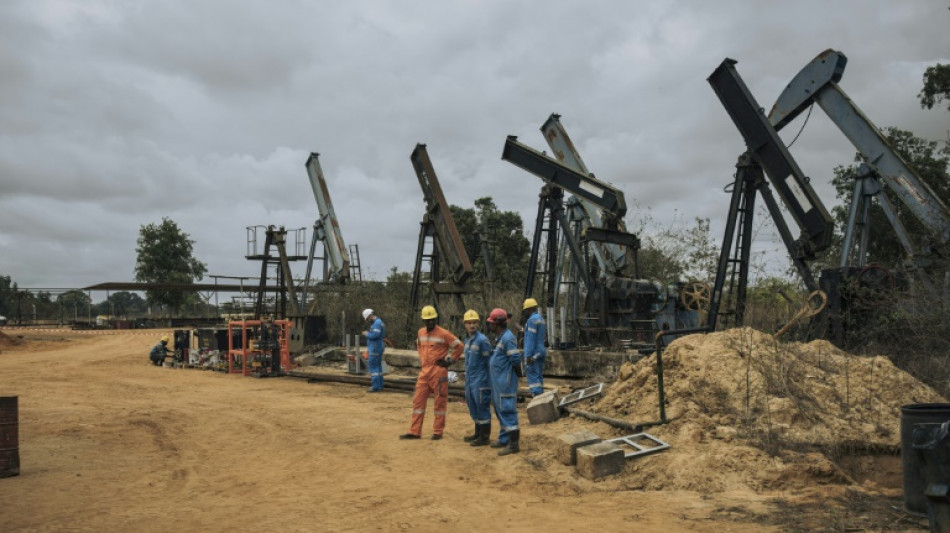
-
 'Timid' Keys makes shaky start to Australian Open title defence
'Timid' Keys makes shaky start to Australian Open title defence
-
Indiana crowned college champions to complete fairytale season

-
 South Koreans go cuckoo for 'Dubai-style' cookies
South Koreans go cuckoo for 'Dubai-style' cookies
-
Harris leads Pistons past Celtics in thriller; Thunder bounce back

-
 Tjen first Indonesian to win at Australian Open in 28 years
Tjen first Indonesian to win at Australian Open in 28 years
-
Long-delayed decision due on Chinese mega-embassy in London

-
 Djokovic jokes that he wants slice of Alcaraz's winnings
Djokovic jokes that he wants slice of Alcaraz's winnings
-
Trump tariff threat 'poison' for Germany's fragile recovery
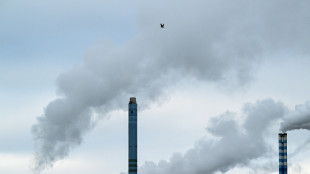
-
 Tourists hit record in Japan, despite plunge from China
Tourists hit record in Japan, despite plunge from China
-
Jittery Keys opens Melbourne defence as Sinner begins hat-trick quest

-
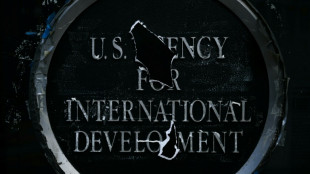 The impact of Trump's foreign aid cuts, one year on
The impact of Trump's foreign aid cuts, one year on
-
Belgian court weighs trial for ex-diplomat over Lumumba killing

-
 Inside China's buzzing AI scene year after DeepSeek shock
Inside China's buzzing AI scene year after DeepSeek shock
-
Asian markets sink, silver hits record as Greenland fears mount
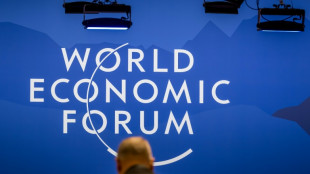
-
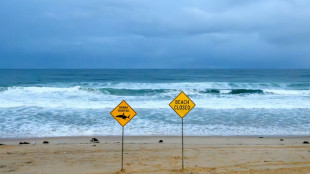 Shark bites surfer in Australian state's fourth attack in 48 hours
Shark bites surfer in Australian state's fourth attack in 48 hours
-
North Korea's Kim sacks vice premier, rails against 'incompetence'
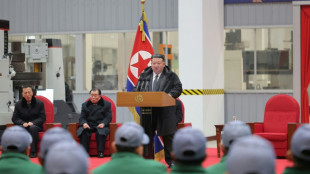
-
 Spain mourns as train crash toll rises to 40
Spain mourns as train crash toll rises to 40
-
'Very nervous' Keys makes shaky start to Australian Open title defence

-
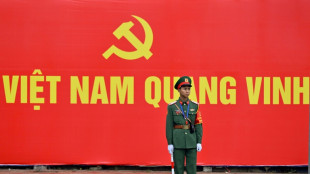 Vietnam leader promises graft fight as he eyes China-style powers
Vietnam leader promises graft fight as he eyes China-style powers
-
Dad-to-be Ruud ready to walk away from Australian Open

-
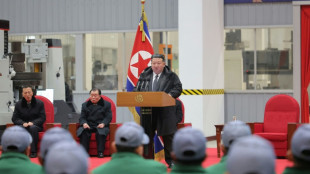 North Korea's Kim sacks senior official, slams 'incompetence'
North Korea's Kim sacks senior official, slams 'incompetence'
-
Farewells, fresh faces at Men's Fashion Week in Paris

-
 'I do not want to reconcile with my family' says Brooklyn Peltz Beckham
'I do not want to reconcile with my family' says Brooklyn Peltz Beckham
-
EU leaders take stage in Davos as Trump rocks global order
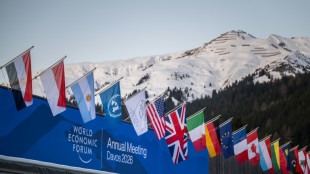
-
 Blast at Chinese restaurant in Kabul kills 7
Blast at Chinese restaurant in Kabul kills 7
-
Warner hits 'Sinners' and 'One Battle' tipped for Oscar nominations
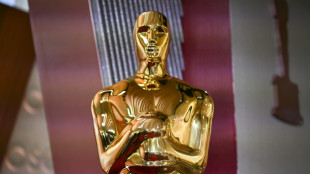
-
 Colombian paramilitary-turned-peace-envoy sentenced over atrocities
Colombian paramilitary-turned-peace-envoy sentenced over atrocities
-
Gilgeous-Alexander leads Thunder in rout of Cavaliers

-
 Seahawks blow as Charbonnet ruled out for rest of season
Seahawks blow as Charbonnet ruled out for rest of season
-
Kostoulas stunner rescues Brighton draw after penalty row

-
 Man Utd greats tell Martinez to 'grow up' as feud rumbles on
Man Utd greats tell Martinez to 'grow up' as feud rumbles on
-
LeBron James' All-Star streak over as starters named

-
 Allies tepid on Trump 'peace board' with $1bn permanent member fee
Allies tepid on Trump 'peace board' with $1bn permanent member fee
-
Ninth policeman dies in Guatemala gang riots, attacks

-
 Man City's Foden to play through pain of broken hand
Man City's Foden to play through pain of broken hand
-
Milan Fashion Week showcases precision in uncertain times

-
 Public media in Europe under unprecedented strain
Public media in Europe under unprecedented strain
-
Africa Cup of Nations refereeing gets a red card

-
 Tributes pour in after death of Italian designer Valentino
Tributes pour in after death of Italian designer Valentino
-
Bills fire coach McDermott after playoff exit: team

-
 Chile wildfires rage for third day, entire towns wiped out
Chile wildfires rage for third day, entire towns wiped out
-
Valentino, Italy's fashion king who pursued beauty at every turn, dies at 93

-
 France PM to force budget into law, concedes 'partial failure'
France PM to force budget into law, concedes 'partial failure'
-
Allies tepid on Trump 'peace board' with $1bln permanent member fee

-
 'My soul is aching,' says Diaz after AFCON penalty miss
'My soul is aching,' says Diaz after AFCON penalty miss
-
Ex-OPEC president in UK court ahead of corruption trial

-
 Iran warns protesters who joined 'riots' to surrender
Iran warns protesters who joined 'riots' to surrender
-
Stop 'appeasing' bully Trump, Amnesty chief tells Europe

-
 Central African Republic top court says Touadera won 78% of vote
Central African Republic top court says Touadera won 78% of vote
-
Trump tariff threat has global investors running for cover


After Davos, a race for money to stop climate change
US climate envoy John Kerry bluntly summed up in one word what the planet needs to avoid a global warming catastrophe at the World Economic Forum this week: money.
The annual meeting of the global elite in the Swiss Alpine resort of Davos was a chance for top government officials, CEOs, academics and campaigners to debate how to tackle the climate crisis.
The bill is monumental: Kerry and others warned that trillions of dollars were needed to speed up the world's efforts to reach net-zero carbon emissions by 2050 and limit warming to 1.5 degrees Celsius.
But the week-long forum exposed fault lines over how to meet those targets at a time when the world faces a costly war in Ukraine, an economic downturn, soaring inflation and a cost-of-living crisis.
The US government is pouring $369 billion dollars into its green energy transition through tax incentives and subsidies for electric cars and other technology under its landmark Inflation Reduction Act (IRA).
Kerry warned however that public funds alone were not enough, as he used his Davos appearance to press his case that the private sector has a major role to play -- if firms can be shown there is money to be made.
The former US secretary of state admitted that he sounded like the corporate raider Gordon Gekko from the film "Wall Street" when he said earlier this week that "money, money, money, money, money, money, money" was needed to meet the 1.5C target.
"The magic that we need is to unleash those trillions of dollars that are looking for good investments, but they're looking for bankable investments," Kerry said.
But at the same panel, Ecuadoran climate activist Helena Gualinga said profit was being placed above the health of the planet.
"When I hear a lot of these conversations I think it's very business first, and then we'll deal with climate and then we'll deal with biodiversity loss," she said. "That needs to be reversed."
- US-EU spat -
Other disagreements returned to the fore in Davos.
While many praised US President Joe Biden's IRA programme as a game-changer for the climate crisis, Europeans continued to denounce what they describe as discriminatory subsidies favouring US businesses.
The two sides held talks in Davos as they seek to find a compromise.
"We're friends," Kerry told AFP. "We need to work together and I think there's a lot of listening going on and discussions to address those things that are concerns."
European industrialists said the EU should step up its game and respond with its own version of the IRA if it wants to remain competitive.
"Yes, we are going to the US. We are taking the cheque from IRA, and fair enough," Ilham Kadri, CEO of Belgian chemicals giant Solvay, said at an event hosted by Belgian Prime Minister Alexander De Croo.
European Union chief Ursula von der Leyen announced plans in Davos for a special fund and a "Net Zero Industry Act" to defend Europe's industrial base from US and Chinese industrial subsidies.
- Western 'hypocrisy' -
IMF chief Kristalina Georgieva voiced concerns that Western efforts to use public money to step up private investment could be detrimental to developing nations, which are the most exposed to the effects of climate change.
"If we are to strive to get the industrialised world clean and we don't think about the emerging markets, we are all cooked," she said Friday.
Wealthy nations have already fallen behind on their pledges to deliver $100 billion per year to help developing countries green their economies and build resilience against future impacts of climate change.
Climate financing will be among the core issues to be discussed at the COP28 summit hosted by the United Arab Emirates later this year.
The president of the Democratic Republic of Congo, Felix Tshisekedi, slammed the "hypocrisy" of criticising his country for wanting to exploit fossil fuels for its development while wealthy polluters have failed to provide the money promised to help its energy transition.
"I think this money would allow us to get the technology faster if everyone kept their word," Tshisekedi said.
O.Lorenz--BTB



